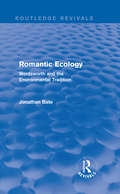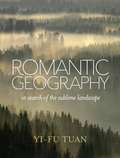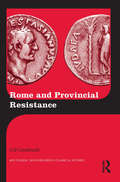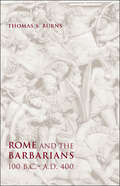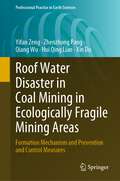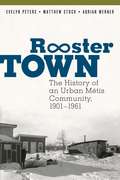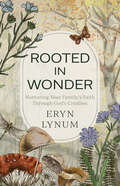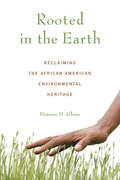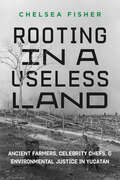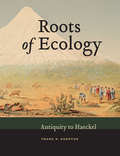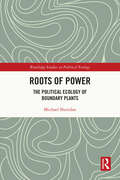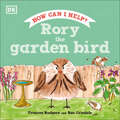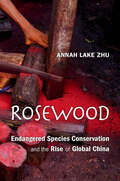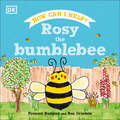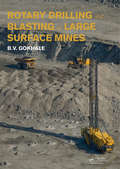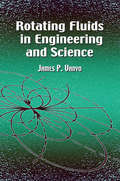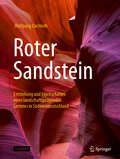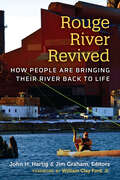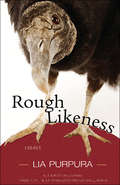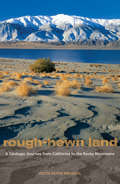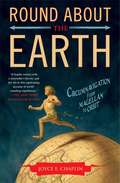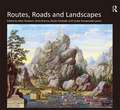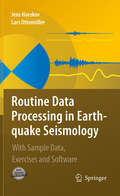- Table View
- List View
Romantic Ecology: Wordsworth and the Environmental Tradition (Routledge Revivals)
by Jonathan BateFirst published in 1991, Romantic Ecology reassesses the poetry of William Wordsworth in the context of the abiding pastoral tradition in English Literature. Jonathan Bate explores the politics of poetry and argues that contrary to critics who suggest that the Wordsworth was a reactionary who failed to represent the harsh economic reality of his native Lake District, the poet’s politics were fundamentally ‘green’. As our first truly ecological poet, Wordsworth articulated a powerful and enduring vision of human integration with nature which exercised a formative influence on later conservation movements and is of immediate relevance to great environmental issues today. Challenging the orthodoxies of new historicist criticism, Jonathan Bate sets a new agenda for the study of Romanticism in the 1990s.
Romantic Geography
by Yi-Fu TuanGeography is useful, indeed necessary, to survival. Everyone must know where to find food, water, and a place of rest, and, in the modern world, all must make an effort to make the Earth--our home--habitable. But much present-day geography lacks drama, with its maps and statistics, descriptions and analysis, but no acts of chivalry, no sense of quest. Not long ago, however, geography was romantic. Heroic explorers ventured to forbidding environments--oceans, mountains, forests, caves, deserts, polar ice caps--to test their power of endurance for reasons they couldn't fully articulate. Why climb Everest? "Because it is there. " Yi-Fu Tuan has established a global reputation for deepening the field of geography by examining its moral, universal, philosophical, and poetic potentials and implications. In his twenty-second book, Romantic Geography, he continues to engage the wide-ranging ideas that have made him one of the most influential geographers of our time. In this elegant meditation, he considers the human tendency--stronger in some cultures than in others--to veer away from the middle ground of common sense to embrace the polarized values of light and darkness, high and low, chaos and form, mind and body. In so doing, venturesome humans can find salvation in geographies that cater not so much to survival needs (or even to good, comfortable living) as to the passionate and romantic aspirations of their nature. Romantic Geography is thus a paean to the human spirit, which can lift us to the heights but also plunge us into the abyss.
Rome and Provincial Resistance (Routledge Monographs in Classical Studies)
by Gil GambashThis book demonstrates and analyzes patterns in the response of the Imperial Roman state to local resistance, focusing on decisions made within military and administrative organizations during the Principate. Through a thorough investigation of the official Roman approach towards local revolt, author Gil Gambash answers significant questions that, until now, have produced conflicting explanations in the literature: Was Rome’s rule of its empire mostly based on oppressive measures, or on the willing cooperation of local populations? To what extent did Roman decisions and actions indicate a dedication towards stability in the provinces? And to what degree were Roman interests pursued at the risk of provoking local resistance? Examining the motivations and judgment of decision-makers within the military and administrative organizations – from the emperor down to the provincial procurator – this book reconstructs the premises for decisions and ensuing actions that promoted negotiation and cooperation with local populations. A ground-breaking work that, for the first time, provides a centralized view of Roman responses to indigenous revolt, Rome and Provincial Resistance is essential reading for scholars of Roman imperial history.
Rome and the Barbarians, 100 B.C.–A.D. 400 (Ancient Society and History)
by Thomas S. BurnsThis historical analysis of Roman-Barbarian relations from the Republic into late antiquity offers a striking new perspective on the fall of the Empire.The barbarians of antiquity, often portrayed simply as the savages who destroyed Rome, emerge in this colorful, richly textured history as a much more complex factor in the expansion, and eventual unmaking, of the Roman Empire. Thomas S. Burns marshals an abundance of archeological and literary evidence to bring forth a detailed and wide-ranging account of the relations between Romans and non-Romans along the frontiers of western Europe.Looking at a 500-year time span beginning with early encounters between barbarians and Romans around 100 B.C. and ending with the spread of barbarian settlement in the western Empire, Burns reframes the barbarians as neighbors, friends, and settlers. His nuanced history subtly shows how Rome’s relations with the barbarians slowly evolved from general ignorance, hostility, and suspicion toward tolerance, synergy, and integration. This long period of acculturation led to a new Romano-barbarian hybrid society and culture that anticipated the values and traditions of medieval civilization.
Roof Water Disaster in Coal Mining in Ecologically Fragile Mining Areas: Formation Mechanism and Prevention and Control Measures (Professional Practice in Earth Sciences)
by Yifan Zeng Zhenzhong Pang Qiang Wu Hui Qing Lian Xin DuThis book targets to earth scientists and engineers, in particular students, researchers, managers, and practitioners, who are interested in mining engineering, environmental engineering, green coal mining, sustainable water resource management, and effective measures to balance mine safety and ecological conservation. In the disciplines of mine hydrogeology and mining engineering, there have always been difficulties in the theoretical interpretation of the changes in the physical and hydraulic characteristics of water resisting strata during coal seam mining. In the past 10 years, the authors studied the relevant contents by using the methods of physical simulation, numerical simulation, field test and mining practice of similar materials, so as to understand the internal relationship between the stratigraphic sedimentary characteristics of the mining area and the occurrence mechanism of mine water disaster. On the premise of analyzing and studying the stratigraphic sedimentary environment in the mining area in detail, it is of great significance for the realization of "coal water" dual resource mining in the mining area to divide the types of roof water disaster in the mining area and study the formation mechanism of mine water disaster caused by different rock formation combinations and mining methods.
Rooster Town: The History of an Urban Métis Community, 1901–1961
by Evelyn Peters Matthew Stock Adrian WernerMelonville. Smokey Hollow. Bannock Town. Fort Tuyau. Little Chicago. Mud Flats. Pumpville. Tintown. La Couleeese were some of the names given to Métis communities at the edges of urban areas in Manitoba. Rooster Town, which was on the outskirts of southwest Winnipeg endured from 1901 to 1961. Those years in Winnipeg were characterized by the twin pressures of depression, and inflation, chronic housing shortages, and a spotty social support network. At the city’s edge, Rooster Town grew without city services as rural Métis arrived to participate in the urban economy and build their own houses while keeping Métis culture and community as a central part of their lives. In other growing settler cities, the Indigenous experience was largely characterized by removal and confinement. But the continuing presence of Métis living and working in the city, and the establishment of Rooster Town itself, made the Winnipeg experience unique. Rooster Town documents the story of a community rooted in kinship, culture, and historical circumstance, whose residents existed unofficially in the cracks of municipal bureaucracy, while navigating the legacy of settler colonialism and the demands of modernity and urbanization.
Root Cellaring: Natural Cold Storage of Fruits and Vegetables
by Mike Bubel Nancy BubelAnyone can learn to store fruits and vegetables safely and naturally with a cool, dark space (even a closet!) and the step-by-step advice in this book.
Rooted in Wonder: Nurturing Your Family's Faith Through God's Creation
by Eryn LynumMasterfully connects Scripture to nature and nature to God.--Lori Wildenberg, national speaker, parent coach, and authorFor a generation whose eyes are constantly trained on screens, encountering nature at all is increasingly difficult, much less seeing what it reveals about God. How can parents help children reengage with God's world that is full of amazement, creativity, and love?Eryn Lynum is a certified master naturalist, Bible teacher, and mom of four who wants to help families encounter and understand the connection between God and creation. She shares her own story of putting her kids in front of nature, and invites other parents to consider a similar journey.With practical sections that look at nature through the lens of the Bible and activities to integrate faith and the natural world, Rooted in Wonder helps parents instill within their kids an unshakable faith. Through the art of play, the drive of discovery, and the awe of adventure, children will gain a sense of wonder in their Creator that will last a lifetime."With joy and practical know-how, Eryn Lynum helps parents connect the beauty of creation with love for the Creator. Rooted in Wonder is a must-read for helping the next generation to get outdoors and get to know God."--Matthew Sleeth, MD, executive director of Blessed Earth
Rooted in the Earth: Reclaiming the African American Environmental Heritage
by Dianne GlaveWith a basis in environmental history, this groundbreaking study challenges the idea that a meaningful attachment to nature and the outdoors is contrary to the black experience. The discussion shows that contemporary African American culture is usually seen as an urban culture, one that arose out of the Great Migration and has contributed to international trends in fashion, music, and the arts ever since. But because of this urban focus, many African Americans are not at peace with their rich but tangled agrarian legacy. On one hand, the book shows, nature and violence are connected in black memory, especially in disturbing images such as slave ships on the ocean, exhaustion in the fields, dogs in the woods, and dead bodies hanging from trees. In contrast, though, there is also a competing tradition of African American stewardship of the land that should be better known. Emphasizing the tradition of black environmentalism and using storytelling techniques to dramatize the work of black naturalists, this account corrects the record and urges interested urban dwellers to get back to the land.
Rooting in a Useless Land: Ancient Farmers, Celebrity Chefs, and Environmental Justice in Yucatan
by Chelsea FisherIn Rooting in a Useless Land, Chelsea Fisher examines the deep histories of environmental-justice conflicts in Mexico's Yucatán Peninsula. She draws on her innovative archaeological research in Yaxunah, an Indigenous Maya farming community dealing with land dispossession, but with a surprising twist: Yaxunah happens to be entangled with prestigious sustainable-development projects initiated by some of the most famous chefs in the world. Fisher contends that these sustainable-development initiatives inadvertently bolster the useless-land narrative—a colonial belief that Maya forests are empty wastelands—which has been driving Indigenous land dispossession and environmental injustice for centuries. Rooting in a Useless Land explores how archaeology, practiced within communities, can restore history and strengthen relationships built on contested ground.
Roots of Ecology
by Frank N. EgertonEcology is the centerpiece of many of the most important decisions that face humanity. Roots of Ecology documents the deep ancestry of this now enormously important science from the early ideas of Herodotos, Plato, and Pliny, up through those of Linnaeus and Darwin, to those that inspired Ernst Haeckel's mid-nineteenth-century neologism ecology. Based on a long-running series of regularly published columns, this important work gathers a vast literature illustrating the development of ecological and environmental concepts, ideas, and creative thought that has led to our modern view of ecology. Roots of Ecology should be on every ecologist's shelf.
Roots of Power: The Political Ecology of Boundary Plants (Routledge Studies in Political Ecology)
by Michael SheridanRoots of Power tells five stories of plants, people, property, politics, peace, and protection in tropical societies. In Cameroon, French Polynesia, Papua New Guinea, St. Vincent, and Tanzania, dracaena and cordyline plants are simultaneously property rights institutions, markers of social organization, and expressions of life-force and vitality. In addition to their localized roles in forming landscapes and societies, these plants mark multiple boundaries and demonstrate deep historical connections across much of the planet’s tropics. These plants’ deep roots in society and culture have made them the routes through which postcolonial agrarian societies have negotiated both social and cultural continuity and change. This book is a multi-sited ethnographic political ecology of ethnobotanical institutions. It uses five parallel case studies to investigate the central phenomenon of "boundary plants" and establish the linkages among the case studies via both ancient and relatively recent demographic transformations such as the Bantu expansion across tropical Africa, the Austronesian expansion into the Pacific, and the colonial system of plantation slavery in the Black Atlantic. Each case study is a social-ecological system with distinctive characteristics stemming from the ways that power is organized by kinship and gender, social ranking, or racialized capitalism. This book contributes to the literature on property rights institutions and land management by arguing that tropical boundary plants’ social entanglements and cultural legitimacy make them effective foundations for development policy. Formal recognition of these institutions could reduce contradiction, conflict, and ambiguity between resource managers and states in postcolonial societies and contribute to sustainable livelihoods and landscapes. This book will appeal to scholars and students of environmental anthropology, political ecology, ethnobotany, landscape studies, colonial history, and development studies, and readers will benefit from its demonstration of the comparative method.
Roots of the Farm Problem
by Luther G. TweetenThis book represents an attempt to extend our knowledge of the fundamentals of the farm problem and the coming shape of the agricultural industry. Its emphasis is on the demand for inputs. It examines the forces which have increased the use of such capital items as fertilizer and chemicals, farm machinery and operating inputs; it appraises those forces which are causing rapid changes in technology and output. The data used here also indicate the response expected in output and in use of capital or labor inputs as prices of these farm resources and farm products change by given amounts.
Rory the Garden Bird (Roly and Friends #Vol. 3)
by Frances RodgersPerfect for little animal lovers, this beautiful early learning book shows you how to help adorable animals that like to visit your yard.Meet Rory. He&’s a small, inquisitive bird who loves to visit yards and gardens, including yours! From stinky rubbish to hungry cats, the yard can sometimes be a dangerous place. Will you volunteer to help keep him safe?This illustrated children&’s book about nature is perfect for gently introducing young readers to the idea of animal conservation and protection. It includes: • Beautifully illustrated spreads. • An engaging storyline that kids can follow and relate to, as the book refers to the wildlife that can be found in their own backyard or garden. • Fun-filled facts about birds. • A thoughtful and timely message about protecting wildlife, with tips for doing so. Join Rory as he sets off into the yard, finding yummy bird mix to munch on and a cozy spot in the trees to rest in after a long, hard day of exploring. Bursting with fun trivia and colorful illustrations, this sweet animal picture book shows kids just how unique birds are, which makes them worth preserving. Perfect for children ages 3-5, this wonderful preschool book provides nature-loving toddlers with plenty of helpful tips and tricks to help keep all their yard guests safe and roaming freely. It&’s the ultimate gift for curious children or budding environmentalists.Rory the Garden Bird is part of a beautiful series from DK that aims to inspire youngsters to discover so much of what is unseen in their yards, and teach them how to care for their yard-dwelling friends. Other titles in this series include Roly the Hedgehog, Roxy the Butterfly and Rosy the Bumblebee.
Rosewood: Endangered Species Conservation and the Rise of Global China
by Annah Lake ZhuA riveting study of the booming rosewood trade between China and Madagascar uncovers an alternative approach to environmentalism that disrupts Western models. Rosewood is the world’s most trafficked endangered species by value, accounting for larger outlays than ivory, rhino horn, and big cats put together. Nearly all rosewood logs are sent to China, fueling a $26 billion market for classically styled furniture. Vast expeditions across Asia and Africa search for the majestic timber, and legions of Chinese ships sail for Madagascar, where rosewood is purchased straight from the forest. The international response has been to interdict the trade, but in this incisive account Annah Lake Zhu suggests that environmentalists have misunderstood both the intent and the effect of China’s appetite for rosewood, causing social and ecological damage in the process. For one thing, Chinese consumers are understandably seeking to reclaim their cultural heritage, restoring a centuries-old tradition of home furnishing that the Cultural Revolution had condemned. In addition, Chinese firms are investing in environmental preservation. Far from simply exploiting the tree, businesses are carefully managing valuable forests and experimenting with extensive new plantings. This sustainable-use paradigm differs dramatically from the conservation norms preferred by Western-dominated NGOs, whose trade bans have prompted speculation and high prices, even encouraging criminal activity. Meanwhile, attempts to arm conservation task forces—militias meant to guard the forests—have backfired. Drawing on years of fieldwork in China and Madagascar, Rosewood upends the pieties of the global aid industry. Zhu offers a rigorous look at what environmentalism and biodiversity protection might look like in a world no longer dominated by the West.
Rosy the Bumblebee (Roly and Friends #Vol. 2)
by Frances RodgersA delightful picture book that shows young readers how they can help the sweet bumblebees that like to visit gardens, parks, and outdoor spaces.Step outside and find out how you can help the adorable animals that like to visit parks, outdoor spaces, and gardens. Little ones will love following Rosy the Bumblebee as she flies around outside, finding wonderfully colorful flowers to feed on and a cozy corner to rest in after a long, hard day of exploring—and more importantly, collecting pollen! But with bumps along the way, she&’ll need your help. Will you volunteer as her little helper? This sweet picture book gently introduces young readers to the idea of animal conservation and protection. Bursting with fun trivia, little ones are shown just how unique bumblebees are, which makes them worth preserving. But with plenty of tips and tricks for how we can care for garden-dwelling friends like Rosy and keep them safe from the dangers they may face, no one is too young to start making a difference. Rosy the Bumblebee is the perfect gift for any small-animal lover, or budding environmentalist, and will inspire toddlers to discover so much of what is unseen outdoors.
Rotary Drilling and Blasting in Large Surface Mines
by Bhalchandra V. GokhaleIn large surface mining operations, drilling and blasting activities constitute more than 15% of the total costs. In order to optimize performance and minimize costs, a thorough knowledge of drill and blast operations is, therefore, extremely important.In this unique reference volume, rotary blasthole drilling and surface blasting, as applied in la
Rotating Fluids in Engineering and Science
by James P. VanyoInvaluable for engineers and scientists whose projects require a knowledge of the theory. Part I reviews basic fluid mechanics. Part II introduces concepts, theories, and equations specific to rotating fluids, and Part III presents numerous practical applications of the theory, in fields ranging from centrifuges to aerodynamics. "Highly recommended." -- Choice.
Roter Sandstein: Entstehung und Eigenschaften eines landschaftsprägenden Gesteins in Südwestdeutschland
by Wolfgang DachrothEntdecken Sie die faszinierende Welt der roten Sandsteine!Rote Sandsteine, ein wahrhaft einzigartiges Kapitel unserer Erde, erzählen eine Geschichte von Verwitterung und Formationen, die auf jedem Kontinent zu finden sind.Dieses Buch nimmt Sie mit auf eine Reise in den Südwesten Deutschlands und den Nordosten Frankreichs, wo am Rand eines ehemaligen Gebirges der Übergang von grobem Blockschutt zu grobem Sandstein und weiter beckenwärts zu feinerem Sandstein und Letten sichtbar wird. Erfahren Sie, wie kurzzeitig wasserführende Flüsse Gebirgsschutt in Binnensenken und in Richtung Meer verfrachteten, Sandstürme Feinsand und Staub weitflächig verteilten, und wie Winde Sand in Dünen und Ebenen auftürmten. In diesem Prozess wurden Gesteinsbruchstücke von Felsen abgeschlagen, als Körner gerundet, sortiert und auf unterschiedliche Weise abgelagert. Die Vielfalt der Entstehung dieser Sandsteine spiegelt sich in den Schichten und Formationen wider. Die roteFarbe verleiht ihnen ein gemeinsames, markantes Merkmal. Jedes Vorkommen roter Sandsteine ist ein Unikat mit seinen eigenen ortsspezifischen Besonderheiten. Diese faszinierenden Gesteine sind meist verborgen, sodass wir beim Wandern in den Mittelgebirgen nur Mutterboden über den Deckschichten zu Gesicht bekommen. Diese Schichten bestehen größtenteils aus dem Verwitterungsprodukt der roten Sandsteine, und auch sie verdienen eine genauere Betrachtung.Der Sand und Staub, der die roten Sandsteine aufbaut, ist aus anderen, zu Roterde verwitterten Gesteinen hervorgegangen und kam teils als Formation gleichartiger Sandsteine zur Ablagerung, teils als Sandsteinschichten mit wechselnden Eigenschaften. Beim Absinken der Erdoberfläche in größere Tiefen wurden während der geologischen Epochen mehrere hundert bis über tausend Meter Sandstein akkumuliert. Bei veränderten Gebirgsbildungsprozessen wurden diese Sandsteine wieder herausgehoben und an der Oberfläche der Verwitterung ausgesetzt. Hier sehen wir sie in unterschiedlicher Form und Festigkeit an aufragenden Felsen, in den Wänden von Höhlen und in Abgrabungen.Das Buch richtet sich an all diejenigen, die sich für die Geologie und die Geschichte unserer Erde interessieren. Tauchen Sie ein in die Welt der roten Sandsteine und lassen Sie sich auf eine wissenschaftliche Reise mitnehmen, um diese Gesteine zu erkunden und zu verstehen – und dabei auch einen Teil Ihrer Heimat zu entdecken.
Rouge River Revived: How People Are Bringing Their River Back to Life
by John H. Hartig Jim GrahamThe Rouge River is a mostly urbanized watershed of about 500 square miles populated by nearly 1.4 million people. While not geographically large, the river has played an outsized role in the history of southeast Michigan, most famously housing Ford Motor Company’s massive Rouge Factory, designed by architect Albert Kahn and later memorialized in Diego Rivera’s renowned “Detroit Industry” murals. In recent decades, the story of the Rouge River has also been one of grassroots environmental activism. After pollution from the Ford complex and neighboring factories literally caused the river to catch on fire in 1969, community groups launched a Herculean effort to restore and protect the watershed. Today the Rouge stands as one of the most successful examples of urban river revival in the country. Rouge River Revived describes the river’s history from pre-European times into the 21st century. Chapters cover topics such as Native American life on the Rouge; indigenous flora and fauna over time; the river’s role in the founding of local cities; its key involvement in Detroit’s urban development and intensive industrialization; and the dramatic clean-up arising from citizen concern and activism. This book is not only a history of the environment of the Rouge River, but also of the complex and evolving relationship between humans and natural spaces.
Rough Likeness: Essays
by Lia PurpuraLia Purpura's essays are full of joy in the act of intense observation; they're also deliciously subversive and alert to the ways language gets locked and loaded by culture. These elegant, conversational excursions refuse to let a reader slide over anything, from the tiniest shards of beach glass to barren big-box wastelands. They detonate distractedness, superficiality, artificiality. In the process, Purpura inhabits many stances: metaphysician and biologist, sensualist and witness-all in service of illuminating that which Virginia Woolf called "moments of being"-previously unworded but palpably felt states of existence and knowing. Rough Likeness finds worlds in the minute, and crafts monuments to beauty and strangeness.
Rough-Hewn Land: A Geologic Journey from California to the Rocky Mountains
by Keith Heyer Meldahl"Unfold a map of North America," Keith Heyer Meldahl writes, "and the first thing to grab your eye is the bold shift between the Great Plains and the Rocky Mountains." In this absorbing book, Meldahl takes readers on a 1000-mile-long field trip back through more than 100 million years of deep time to explore America’s most spectacular and scientifically intriguing landscapes. He places us on the outcrops, rock hammer in hand, to examine the evidence for how these rough-hewn lands came to be. We see California and its gold assembled from pieces of old ocean floor and the relentless movements of the Earth’s tectonic plates. We witness the birth of the Rockies. And we investigate the violent earthquakes that continue to shape the region today. Into the West’s geologic story, Meldahl also weaves its human history. As we follow the adventures of John C. Frémont, Mark Twain, the Donner party, and other historic characters, we learn how geologic forces have shaped human experience in the past and how they direct the fate of the West today.
Round About the Earth
by Joyce E. ChaplinIn this first full history of around-the-world travel, Joyce E. Chaplin brilliantly tells the story of circumnavigation. Round About the Earth is a witty, erudite, and colorful account of the outrageous ambitions that have inspired men and women to circle the entire planet. For almost five hundred years, human beings have been finding ways to circle the Earth--by sail, steam, or liquid fuel; by cycling, driving, flying, going into orbit, even by using their own bodily power. The story begins with the first centuries of circumnavigation, when few survived the attempt: in 1519, Ferdinand Magellan left Spain with five ships and 270 men, but only one ship and thirty-five men returned, not including Magellan, who died in the Philippines. Starting with these dangerous voyages, Joyce Chaplin takes us on a trip of our own as we travel with Francis Drake, William Dampier, Louis-Antoine de Bougainville, and James Cook. Eventually sea travel grew much safer and passengers came on board. The most famous was Charles Darwin, but some intrepid women became circumnavigators too--a Lady Brassey, for example. Circumnavigation became a fad, as captured in Jules Verne's classic novel, Around the World in Eighty Days. Once continental railroads were built, circumnavigators could traverse sea and land. Newspapers sponsored racing contests, and people sought ways to distinguish themselves--by bicycling around the world, for instance, or by sailing solo. Steamships turned round-the-world travel into a luxurious experience, as with the tours of Thomas Cook & Son. Famous authors wrote up their adventures, including Mark Twain and Jack London and Elizabeth Jane Cochrane (better known as Nellie Bly). Finally humans took to the skies to circle the globe in airplanes. Not much later, Sputnik, Gagarin, and Glenn pioneered a new kind of circumnavigation-- in orbit. Through it all, the desire to take on the planet has tested the courage and capacity of the bold men and women who took up the challenge. Their exploits show us why we think of the Earth as home. Round About the Earth is itself a thrilling adventure.
Routes, Roads and Landscapes
by Janike Kampevold Larsen Brita BrennaRoutes and roads make their way into and across the landscape, defining it as landscape and making it accessible for many kinds of uses and perceptions. Bringing together outstanding scholars from cultural history, geography, philosophy, and a host of other disciplines, this collection examines the complex entanglement between routes and landscapes. It traces the changing conceptions of the landscape from the Enlightenment to the present day, looking at how movement has been facilitated, imagined and represented and how such movement, in turn, has conditioned understandings of the landscape. A particular focus is on the modern transportation landscape as it came into being with the canal, the railway, and the automobile. These modes of transport have had a profound impact on the perception and conceptualization of the modern landscape, a relationship investigated in detail by authors such as Gernot Böhme, Sarah Bonnemaison, Tim Cresswell, Finola O'Kane, Charlotte Klonk, Peter Merriman, Christine Macy, David Nye, Vittoria Di Palma, Charles Withers, and Thomas Zeller.
Routine Data Processing in Earthquake Seismology
by Jens Havskov Lars OttemollerThe purpose of this book is to get a practical understanding of the most common processing techniques in earthquake seismology. The book deals with manual methods and computer assisted methods. Each topic will be introduced with the basic theory followed by practical examples and exercises. There are manual exercises entirely based on the printed material of the book, as well as computer exercises based on public domain software. Most exercises are computer based. The software used, as well as all test data are available from http://extras.springer.com. This book is intended for everyone processing earthquake data, both in the observatory routine and in connection with research. Using the exercises, the book can also be used as a basis for university courses in earthquake processing. Since the main emphasis is on processing, the theory will only be dealt with to the extent needed to understand the processing steps, however references will be given to where more extensive explanations can be found. Includes: * Exercises * Test data * Public domain software (SEISAN) available from http://extras.springer.com
